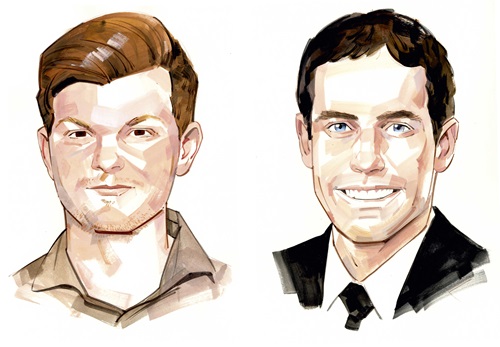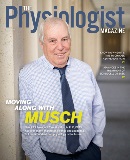Time Travel
Reflecting back to the most difficult days of graduate school.
 Each issue, we ask
a student or early-career member to pose their career questions to an established investigator and mentor. Here, Dain W. Jacob, a graduate research assistant in exercise physiology at the University of Missouri, asks Steven J. Elmer, PhD, to reflect
on what he has learned since grad school. Elmer is interim chair, graduate program director and associate professor in the Department of Kinesiology and Integrative Physiology at Michigan Technological University.
Each issue, we ask
a student or early-career member to pose their career questions to an established investigator and mentor. Here, Dain W. Jacob, a graduate research assistant in exercise physiology at the University of Missouri, asks Steven J. Elmer, PhD, to reflect
on what he has learned since grad school. Elmer is interim chair, graduate program director and associate professor in the Department of Kinesiology and Integrative Physiology at Michigan Technological University.
Q: If “present
you” could talk to “past you,” what would you tell yourself during your hardest year of graduate school?
A: Here are a couple of things I would tell my younger self: First, watch the video on YouTube of President John F. Kennedy
delivering the commencement address to Rice University in 1962. During his speech, Kennedy said, “We choose to go to the moon in this decade and do the other things, not because they are easy, but because they are hard.” Remember, if completing
a graduate degree was easy, then everyone would do it. Don’t lose sight of your end goal. You will get to the moon!
Start to get comfortable with the element of “surprise” and learn to deal with the unexpected. Sometimes no matter
how well you prepare, things do not go according to plan. In your thesis proposal and future grant applications include a section titled “potential problems and alternative solutions” that describes challenges that could arise and strategies
for how to circumvent them.
As a scientist, be confident in your ability to adapt, problem-solve and find ways to keep moving forward. Also, there will come a time when two key pieces of laboratory equipment fail spectacularly during the first day
of your thesis data collection. Rest assured you will overcome this setback! Your adviser will also remind you for years to come that they still occasionally find tiny ball bearings on the floor from that morning.
Q: Do you have any tips for managing a healthy, yet realistic, work-life balance?
A: Prioritize your overall health and well-being and find something that helps take your mind off work to relax and reduce stress. Try something like meditation or mindfulness or movements such as yoga, qigong or tai chi. Set aside a block of time each week where you unplug and take a break from screens. Protect your time by saying “no” sometimes. With coursework, research and teaching responsibilities you already have a lot going on and it’s easy to say “yes” to extra things. Stay focused on your research, prioritize things, and when in doubt seek input from your adviser on whether to commit or not.
And stay socially connected with others. As we get immersed in our work, we can become isolated and socially disconnected. Lastly, don’t hesitate to use the resources available through your campus center for student mental health and well-being.
Q: If you had not become a physiologist,
what do you think you’d be doing?
A: My initial interest was in becoming an athletic trainer and then later a physician. So, I would like to think I would be working in the field of sports medicine. On a related note, I would encourage
graduate students to attend a few professional development sessions, such as a webinar or symposium, that highlight atypical career paths and careers outside academia. Identifying other potential career options might open doors you didn’t know existed.
Q: What is your favorite scientific technique or methodology?
A: Hands down it would be the equipment and procedures for measuring maximal oxygen consumption (VO2max) during exercise. When I was a first-year exercise science undergraduate
student I had the opportunity to complete a running VO2max test and loved it. Since then, I have administered this test in teaching and research settings with a wide variety of healthy, athletic and clinical populations. It never gets old!.
Got a career question you'd like to submit? Email it to tphysmag@physiology.org. We may use it in an upcoming Mentoring Q&A.
This article was originally published in the March 2024 issue of The Physiologist Magazine. Copyright © 2024 by the American Physiological Society.
The Physiologist Magazine
Read the Latest Issue
Don’t miss out on the latest topics in science and research.
View the Issue Archive
Catch up on all the issues of The Physiologist Magazine.
Contact Us
For questions, comments or to share your story ideas, email us or call 301.634.7314.


